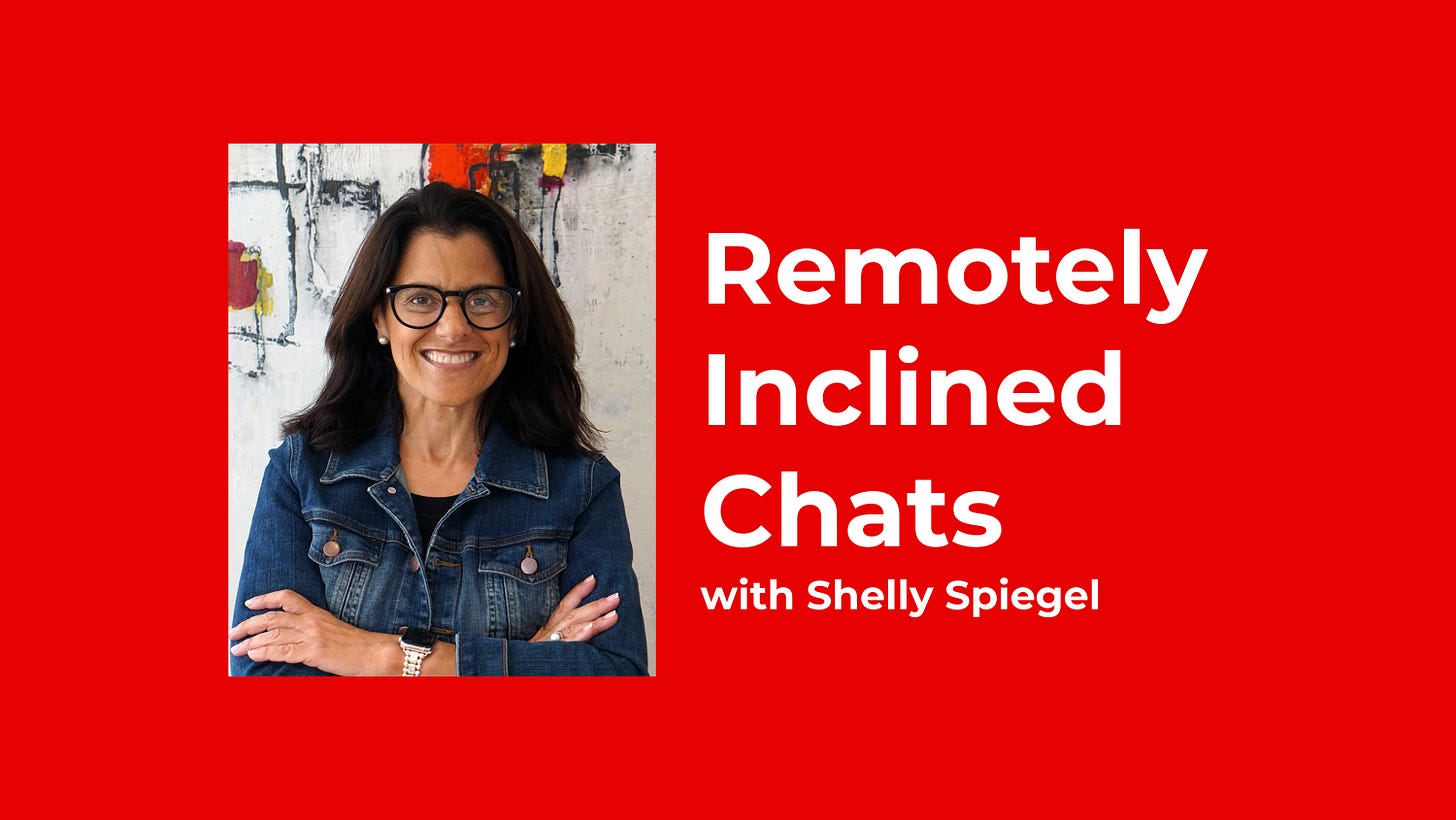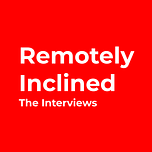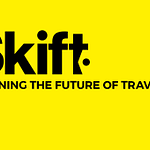
Hi,
Welcome to Remotely Inclined, a newsletter about remote work and remote entrepreneurship. If you’d like to sign up, you can do so here. Want to share your feedback? Take this short survey. Or just read on…
Shelly Spiegel’s company Fire Engine RED has been remote since she founded it in 2001. However, she didn’t feel she could talk about it for 10 years, worried that people would judge her company for not having an office space. Things changed in 2011 when Fire Engine RED won an award for its culture, noting they were the first remote company to win the award. Many people were shocked at the idea that a remote company could have a culture, let alone an award-winning one.
Since 2011, Shelly has been more vocal about her all-remote company, writing a book on her methods called Fully Remote (formerly Virtual Possibility) and regularly commenting on the remote work world, including putting together one of the first directories of all-remote companies.
In particular, Shelly is proud of Fire Engine RED’s culture. The 80+ person company has an impressive retention rate and average tenure of 6.5 years, nearly 50% higher than the American average.

In our chat, Shelly shared the tactical ways she builds culture remotely -- and explains how other companies can adopt the practices for themselves.
Remote culture tactics
I believe our culture is why our team member retention rate is 92% and the average team member stays with us for 6.5 years. Some of our team members are even moving in 7-10 years.
I always say that being CEO is not just being the Chief Executive Officer but also the Chief Entertainment Officer. You can’t just focus on growing the business, you have to focus on your team as well.
Transparency
You name it, I’ll answer the question.
I also have a feedback system where people can participate - they can ask me any question anonymously and I will respond within 24 hours, and share my response with the team. So people know I will answer the question and take action if need be.
For example, we used to put people’s phone numbers on our website, and I got feedback that people were getting tons of spam calls. Within 24 hours, they were removed.
Psst, liking this article? Why not share it with a friend or five?
Fun
Something else that’s popular is what we call Walking Wednesdays. It’s a phone call (totally voluntary) with a topic that has nothing to do with work. It could be about your first car or your first job’s team members, or something else.
It’s optional, and people go for a walk wherever they are (our team stretches across 26 states and 5 countries). I kick it off then it just becomes a conversation. It works even though we have a team of 80 people -- I would say we have about an 80% of our team that joins each week.
Recognition
We have a Slack channel called REDcognition, where we recognize members of our team for the good work they do for one another. We also post when good client feedback comes in because I want the team to know about it.
Civic duty
Since we’re in an election year in the US, we set up another Slack channel called I Voted, where people can post messages with them voting or with the I Voted sticker on them, their pet, or their kids.
We also joined an organization called Make Time To Vote, which is an initiative in the US where companies commit to letting employees vote on company time, so the time is respected and paid. That’s one of the reasons we started the I Voted channel, and it’s very popular.
An aside: A big part of culture is music. For me, that’s country music (don’t judge). But I also like discovering new music, and I recently learned about Album Daily, a newsletter dedicated to helping you discover - or re-discover - great music.
If you’re a music lover, this newsletter is worth checking out.
Family and COVID
With more family members home than ever before, we’re in the process of putting together a company-wide talent show to showcase our team members’ talents and the talents of their family as well.
Everyone’s excited because it’s not just the team, but also families. And for children especially. In fully remote companies, too, every day can be bring your pet to work day, so one of the things we’re doing with the younger children of our team members is having a pet show and tell call where they can introduce their pets to our team.
The final word
“You can’t just focus on growing the business, you have to focus on your team as well.”
Remotely Inclined Chats with Shelly Spiegel
Transcript edited for brevity and clarity.
Stefan: Welcome, Shelly! Can you share what you’re working on and what Fire Engine RED does?
Shelly: Absolutely. I started Fire Engine RED in December 2001 and from day one we were a fully remote company. We’re coming up now on 20 years.
We primarily serve colleges in the US and work with admissions offices helping them market their institutions to prospective students. On the technology side, we’ve developed a CRM product to help colleges manage their interactions with prospective students. So we’re a hybrid company - marketing and technology.
How has it been growing a remote business in the education field?
Back in 2001 we were an anomaly being remote. We didn’t feel it was in our interest to share that we were remote with our prospective clients for the first 10 years. If people asked, we’d be honest, but we didn’t just talk about it.
In 2011, we applied for an award through Inc Magazine as a top place to work that had a great culture and good values. I was thrilled were one of the 50 companies selected. And in fact we were the first fully remote company to be selected for this award. The judges were shocked that a fully remote company could have a culture.
One of the reasons we went and stayed remote was the ability to hire top talent - and educators became impressed with the team we put together. I would always tell them we were able to do this because we’re fully remote, and thus they became more and more comfortable with that fact.
Should people speak loudly about being remote now, or should they keep it silent?
They should very much talk about it. It’s a positive. It really is. It gives companies the ability to hire top talent.
And when COVID hit, it proved that further from a business perspective.
My worlds collided. We had so many processes in place to work remotely that we could continue working without skipping a beat. And then I gave several webinars to colleges and admissions offices, specifically teaching them how to lead a remote team, since my clients found themselves in this position overnight.
2020 has been the year of change. Now people realize things can change at any moment.
Can you share what you’ve done to build such a strong culture remotely?
I believe our culture is why our team member retention rate is 92% and the average team member stays with us for 6.5 years. Some of our team members are even moving in 7-10 years.
I always say that being CEO is not just being the Chief Executive Officer but also the Chief Entertainment Officer. You can’t just focus on growing the business, you have to focus on your team as well.
Transparency
You name it, I’ll answer the question.
I also have a feedback system where people can participate - they can ask me any question anonymously and I will respond within 24 hours, and share my response with the team. So people know I will answer the question and take action if need be.
For example, we used to put people’s phone numbers on our website, and I got feedback that people were getting tons of spam calls. Within 24 hours, they were removed.
Fun
Something else that’s popular is what we call Walking Wednesdays. It’s a phone call (totally voluntary) with a topic that has nothing to do with work. It could be about your first car or your first job’s team members, or something else.
It’s optional, and people go for a walk wherever they are (our team stretches across 26 states and 5 countries). I kick it off then it just becomes a conversation. It works even though we have a team of 80 people -- I would say we have about an 80% of our team that joins each week.
Recognition
We have a Slack channel called REDcognition, where we recognize members of our team for the good work they do for one another. We also post when good client feedback comes in because I want the team to know about it.
Civic duty
Since we’re in an election year in the US, we set up another Slack channel called I Voted, where people can post messages with them voting or with the I Voted sticker on them, their pet, or their kids.
We also joined an organization called Make Time To Vote, which is an initiative in the US where companies commit to letting employees vote on company time, so the time is respected and paid. That’s one of the reasons we started the I Voted channel, and it’s very popular.
Family and COVID
With more family members home than ever before, we’re in the process of putting together a company-wide talent show to showcase our team members’ talents and the talents of their family as well.
Everyone’s excited because it’s not just the team, but also families. And for children especially. In fully remote companies, too, every day can be bring your pet to work day, so one of the things we’re doing with the younger children of our team members is having a pet show and tell call where they can introduce their pets to our team.
What is your advice for a remote entrepreneur who is feeling in over their head?
Only hire people who share your values.
You can have all the processes in place with the right clients, but it comes down to people. You just can’t focus enough on your people.
Not everyone’s cut out to work remotely, and not everyone’s cut out to work for you. So you’ve got to define your values and find people who share those values.














Share this post